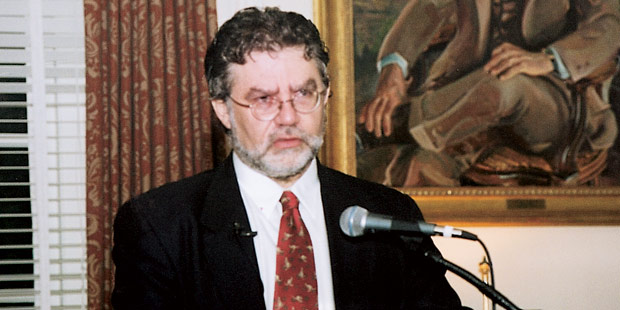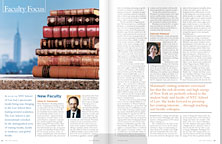Weiler Delivers First Straus Lecture
Printer Friendly VersionNYU School of Law celebrated the creation of the Joseph Straus Professorship in Law by holding an inaugural lecture and dinner. The Straus Professorship was endowed by Daniel Straus (‘81), a second-generation Law School alumnus and trustee, to honor his late father, Joseph, who received an LL.B. in 1937 and an LL.M. in 1943. After graduating from the Law School, Daniel Straus spent a few years as an associate at Paul, Weiss, Rifkind, Wharton & Garrison, and then began managing nursing home facilities through The Multicare Companies Inc., which he and his brother Moshael formed in 1984.
In addition to being the Joseph Straus Professor of Law, Professor Joseph Weiler is University Professor and holds the European Union Jean Monnet Chair. Weiler directs the Hauser Global Law School Program and the Jean Monnet Center for International and Regional Economic Law and Justice.
A world-renowned scholar in the law of the European Union and international economic law, Weiler came to the Law School from Harvard University, where he was the Manley Hudson Professor of Law and also held the Jean Monnet Chair. In addition to his scholarly work, Weiler serves as an international arbitrator in the framework of the World Trade Organization and the North American Free Trade Agreement. He is a board member of numerous academic institutions and learned journals and was appointed most recently to the Council of the Association for Hebraic Studies. His latest book is titled Un’Europa Cristiana (Alba: Palermo; 2003).
Dean Revesz thanked Daniel Straus and his family for their extraordinary support of the Law School. Straus then introduced Weiler, who delivered an hour-long lecture titled “God’s Serpent: On Culpability, Responsibility, and Autonomy in the Story of Eve and Adam” to more than 150 guests of the Law School and the Straus and Weiler families.
Weiler’s speech was, by his own admission, only tangentially related to his legal studies. At the end of his speech, he explained that the motivation for his biblical studies was his own personal battle for a meaningful academic life, and that as a teacher and educator he decided to give this “particular exegesis.” After describing his approach to the study of the Bible and the relationship between Genesis I and II, he moved on to Genesis III and reviewed the description of the fall of Adam and Eve and questioned the appropriateness of their punishment.
“They lack the knowledge of good and bad which, in all our legal and moral systems, is a condition for culpable behavior,” Weiler said. “If they could not tell the difference between good and bad, why such fierce, uncompromising, and eternal punishment for their transgression? Where was their mens rea?”
Weiler argued that the purpose of God’s making Adam and Eve in his image was not actually fulfilled until Eve engaged the Serpent (her inner self) and chose to eat the apple and gain wisdom. This act, then, was not a “fall,” but a realization of God’s will.
“On this reading, it is only upon and through transgression, when God in Genesis III:22 says, ‘Behold, the man is become as one of us, to know good and evil,’ that potentiality becomes reality and creation of man in the image of God is realized,” Weiler said.
Despite its label as the “transgression” or “fall” that prompts God to expel Adam and Eve from the Garden, it is only then that they have truly become human. Weiler contended that the autonomy that comes from the knowledge from the fruit, the ability to know good and evil, is what allows man to truly be in God’s image.
Following the lecture, the dean, colleagues, family members, and friends of the Straus and Weiler families enjoyed a dinner honoring the Straus family. The dinner was a true family affair. Revesz, Professor Vicki Been (’83), Joseph and Ruth Weiler, and Daniel and Joyce Straus were joined by their children and the Straus extended family. The evening was graced by the presence of Daniel’s mother, Gwendolyn Straus, who, sadly, later passed away in the spring of 2003.


 Multimedia
Multimedia